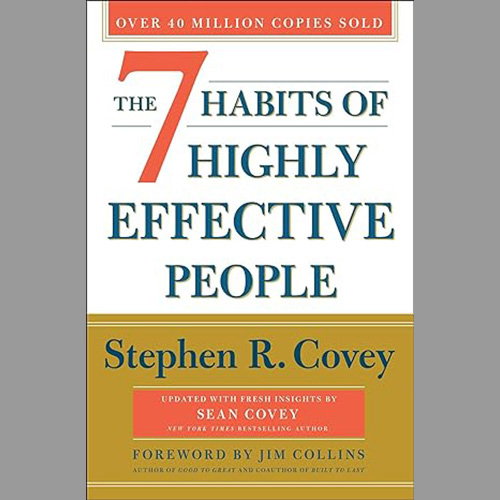
What are QUICK TAKES?
Like many of you, we like to read. These are some of our favorite books. We jotted down some highlights, and we asked our AI team member to organize our thoughts. The name "book summary" is a stretch, so we named this work QUICK TAKES. Definitely some good reads on the list. There is a wide variety of general business books, LEAN books including some classics, as well as books on the power of story telling. Enjoy!
The 7 Habits of Highly Effective People by Stephen R. Covey
Introduction:
"The 7 Habits of Highly Effective People," authored by Stephen R. Covey, is a seminal book in the field of personal development and leadership. First published in 1989, it offers a principle-centered approach for solving personal and professional problems. Covey presents an integrated, holistic, principle-centered approach for living with integrity, honesty, and human dignity – principles that give us the security to adapt to change and the wisdom and power to take advantage of the opportunities that change creates.
The Foundation: Character Ethic vs. Personality Ethic:
Covey begins by distinguishing between two types of ethics: Character Ethic (the foundation of success) and Personality Ethic (secondary traits not necessarily connected to deep values). Covey argues that lasting success and effective living are rooted in Character Ethic, which is about aligning one's values and internal behaviors with universal and timeless principles.
The Seven Habits Explained:
-
Be Proactive: Covey emphasizes taking responsibility for our own lives. Proactivity means understanding that our behavior is a function of our decisions, not our conditions. Proactive people recognize their responsibility to make things happen.
-
Begin with the End in Mind: This habit entails envisioning what you want in the future so you can work and plan towards it. Understanding your end goal ensures that you remain focused on what's truly important, aligning your actions with your values.
-
Put First Things First: This habit involves prioritizing and executing your tasks based on importance rather than urgency. By focusing on critical and important tasks, you ensure that you are making the most valuable use of your time.
-
Think Win-Win: Covey proposes a cooperative approach rather than a competitive one. A win-win mindset fosters mutual respect and beneficial outcomes in interactions and negotiations, leading to more productive and positive relationships.
-
Seek First to Understand, Then to Be Understood: This habit is about effective communication. Covey stresses the importance of empathetic listening to genuinely understand another person's perspective before trying to be understood. This approach fosters respect and opens pathways to more creative and cooperative solutions.
-
Synergize: It's about collaborative teamwork. Synergy allows people to create solutions that are superior to what they could have achieved individually. By valuing and respecting differences, team members can create better solutions than they could alone.
-
Sharpen the Saw: This habit emphasizes the need for continuous improvement and renewal in four areas of life: physical, social/emotional, mental, and spiritual. Covey suggests balancing and renewing your resources, energy, and health to create a sustainable, long-term, effective lifestyle.
Moving from Dependence to Independence to Interdependence:
Covey structures the seven habits along a maturity continuum or spectrum from dependence to independence to interdependence. The first three habits focus on self-mastery and moving from dependence to independence. The next three habits are centered around teamwork, collaboration, and communication, shifting from independence to interdependence. The seventh habit is about continuous growth and improvement, which underpins all the habits.
Implementing the Habits:
Covey not only details what the seven habits are but also provides actionable advice on how to integrate them into one's life. He emphasizes that the transformation from effectiveness requires not just a change in attitude but also a change in behavior. The seven habits are not a quick fix but a process of personal and interpersonal growth and development.
Impact on Leadership and Organizations:
While the book is geared towards personal change, its principles are equally applicable in professional settings. Leaders and organizations worldwide have adopted Covey's habits to improve organizational culture, leadership effectiveness, and overall productivity.
Conclusion:
"The 7 Habits of Highly Effective People" is a comprehensive guide that goes beyond time management or personal effectiveness techniques to touch on fundamental principles for a fulfilling and effective life. Covey's book has not only endured but also remains highly relevant in the ever-changing modern world because of its focus on timeless principles and values.
Reflection:
Covey’s work is more than just a self-help book; it’s a manifesto for personal and professional integrity and effectiveness. Its enduring popularity attests to the universal applicability of its principles. By internalizing and practicing the seven habits, individuals can profoundly change their lives, influence those around them, and achieve a level of effectiveness that transcends mere success. This book is a must-read for anyone committed to personal growth, effective living, and ethical leadership.
